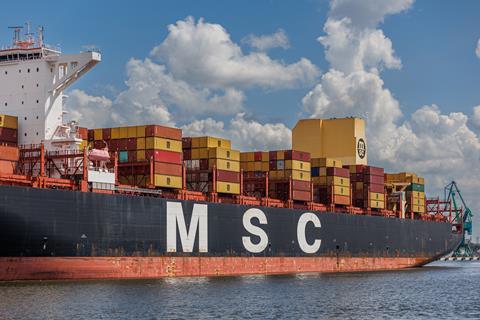Group confirms there will be higher operating costs to ensure compliance with the requirement to use cleaner fuels, meaning an additional emissions surcharge for customers
Shipping giant MSC has released a customer advisory stating that it remained committed to its goal of net zero decarbonisation across its ocean fleet by 2050, as it prepared for FuelEU Maritime.

”Today, we continue to make progress towards that goal through substantial fleet investments and our robust newbuilding programme including more than 125 dual fuel LNG vessels,” the company said. ”All to ensure we are ready to operate on net-zero fuels when they become available at scale.”
MSC said it recognised the importance of decarbonising global supply chains with environmental regulation that provided owners/operators the optionality to comply through measures such as vessel pooling.
The European Union’s FuelEU Maritime Regulation, which becomes effective on 1 January 2025, was part of this regulatory change, it noted.
FuelEU Maritime was adopted by the European Commission with the aim of promoting the use and adoption of cleaner fuels for vessels calling at ports in EU/EEA countries, ultimately incentivising a cleaner fleet profile for the EU.
The regulation is part of the EU’s wider Fit-For-55 package aimed at reducing yearly average greenhouse gas (GHG) emissions by at least 55 per cent by 2030.
FuelEU Maritime sets a maximum limit for the yearly GHG intensity of the energy used by ships calling at European ports, regardless of their flag state.
The GHG reduction targets will be incremental over time with a 2 per cent decrease aimed by 2025 and reaching up to an 80 per cent reduction by 2050.
”As a result of the implementation of FuelEU there will be higher operating costs to ensure compliance with the requirement to use cleaner fuels,” the group outlined.
”Customers will contribute to the additional cost of complying with FuelEU Maritime across the supply chain as they do for other forms of regulation such as IMO 2020 and EU ETS,” MSC added. ”This will result in an additional emissions surcharge for customers.”



